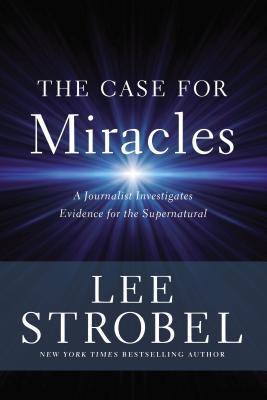After walking through the evidence, theology, and philosophy of the Bible, I began to look more at the supernatural aspects. A journey I’m still on. I’ve often said we’ve taken the magic out of the world.
Former atheist and investigative reporter, Lee Strobel, investigates to see if it’s gone or if it never left.
“Lee Strobel trains his investigative sights on whether it’s credible to believe God intervenes supernaturally in people’s lives today.
This book starts with an unlikely interview in which America’s foremost skeptic builds a seemingly persuasive case against the miraculous. But then Strobel travels the country to quiz scholars to see whether they can offer solid answers to atheist objections. Along the way, he encounters accounts of healings and other phenomena that simply cannot be explained away by naturalistic causes. The book features the results of exclusive new scientific polling that shows miracle accounts are much more common than people think.
What’s more, Strobel delves into the most controversial question of all: what about miracles that don’t happen? If God can intervene in the world, why doesn’t he do it more often to relieve suffering?”
I have the hard copy, so instead of quotes, I’ll go over the table of contents.
Strobel first interviews Dr. Michael Shermer of Skeptic magazine for the case against miracles. For thirty-four pages, the case is built against them.
Following that is an interview with Dr. Craig S. Keener. Keener wrote a heavily-footnoted two-volume set titled Miracles: The Credibility of the New Testament Accounts. That’s a total of 1,172 pages and 620,000 words.
To say he knows his stuff is an understatement. He makes a case for miracles.
In Part 3, Lee interviews Dr. Candy Gunther Brown and Missionary Tom Doyle on Miracles’ Science and Dreams and Visions.
Part 4 is about the most spectacular miracles. Strobel interviews Dr. Michael G. Strauss about the miracle of creation, the universe, and the planet. Then he interviews my favorite detective, J. Warner Wallace, on the Resurrection.
Then he addresses the difficulties of miracles. The Embarrassed by the Supernatural chapter where he interviews Dr. Roger E. Olson is a good one. In fact, I’ll type this passage on pages 221-222.
“I asked Olson if there’s one word that could summarize why a lot of evangelical Christians seem embarassed by the supernatural.
He gave it some thought and then said, “Respectability.”
“Why that word?” I asked.
“Evangelicals in general are trying to live down our past,” he replied. “We’re very aware of Hollywood’s version of us-the oddball preacher, the phony faith healer, the hypermotivational revivalist, the money-grubbing hypocrite. We want to run from those depictions. We want our neighbors to see us as normal people who aren’t very different from them. We are desperate to fit in.”
“So,” I said, “we divorce ourselves from the supernatural, since it seems odd to the world.”
“That’s right. We want to show that we’re cultured and refined, that we’re not gullible or superstitious, that we’re not like the over-the-top fanatics that our neighbors see on television. In fact,” he added, “my experience is that the richer and more educated evangelicals become, the less likely they are to really expect miracles to happen.”
I’ll say again, it’s an excellent chapter. The next chapter is an interview with Dr. Douglas R. Groothuis on when miracles don’t happen.
He doesn’t speak from a podium but from the trenches. His wife is dying, and her mind is slipping from fibromyalgia. They’re seeking a miracle that hasn’t happened. It’s personal.
That’s the closing interview of the book. I give it 5 stars and wrote this on Goodreads. “Easy to read and very clear. Lee starts by interviewing skeptic Michael Shermer to build a case against miracles. Then he interviews people to build the case for miracles, even touching on when prayers aren’t answered.
Overall a very good book.”

No comments:
Post a Comment